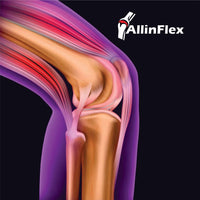The Significance of Joint Health for Men
Joints serve as the crucial connectors that allow movement, flexibility, and stability in the men's body.
Whether it's playing sports, engaging in physically demanding activities, or simply performing day-to-day tasks, men heavily rely on their joints to function optimally. Unfortunately, various factors can impact joint health and compromise their ability to support an active lifestyle.
One significant factor is the natural process of aging.
As men age, the cartilage that cushions the joints gradually wears down, resulting in decreased joint mobility and increased susceptibility to discomfort. Conditions such as osteoarthritis, a common degenerative joint disease, tend to develop with age and can significantly affect joint health. Men who have led an active lifestyle or have experienced sports injuries may also find themselves at a higher risk of joint issues.
Men's tendency to engage in physically demanding activities, contact sports, and heavy weightlifting can place additional stress on the joints.

These activities can lead to joint injuries, strains, sprains, and even more severe damage like ligament tears or dislocations. The repetitive impact and strain put on the joints during sports or intense workouts can contribute to joint wear and tear over time.
Maintaining optimal joint health is crucial for men to continue leading an active and fulfilling life.
Healthy joints allow for smooth movement, enhanced athletic performance, and the ability to partake in activities that bring joy and a sense of accomplishment. Whether it's running, playing basketball, hiking, or simply enjoying an active lifestyle, having strong and resilient joints is essential.
Prioritising joint health through a pro-active approach can help men avoid or minimize joint-related issues.
By incorporating joint supplements, adopting joint-friendly exercise routines, and implementing strategies for injury prevention, men can significantly improve their joint health and overall well-being.
Remember, taking care of joints is not just about physical activity.
It extends to everyday tasks like walking, standing, or even sitting for extended periods. By nurturing joint health, men can safeguard their ability to move comfortably, maintain independence, and enjoy an active lifestyle well into their later years.
Maintaining optimal joint health is essential for men to support an active and fulfilling lifestyle.
By following a comprehensive joint health program that combines exercise, nutrition, and lifestyle habits, men can promote joint strength, flexibility, and overall well-being. Here's a joint health program tailored specifically for men:
- Exercise Routine:
- Incorporate a combination of cardiovascular exercises, strength training, and flexibility exercises into your routine.
- Engage in low-impact activities such as swimming, cycling, or using an elliptical machine to reduce joint strain.
- Include strength training exercises that target major muscle groups to improve joint stability and support. Focus on exercises that don't put excessive stress on the joints, such as using resistance bands, bodyweight exercises, or weight machines.
- Dedicate time to stretching exercises to enhance joint flexibility and range of motion. Include exercises that target the major joints like the shoulders, hips, knees, and ankles.
- Weight Management:
- Maintain a healthy weight to alleviate excess stress on the joints, particularly weight-bearing joints like the knees and hips.
- Combine regular exercise with a balanced diet to achieve and maintain a healthy weight. Include nutrient-dense foods, plenty of fruits and vegetables, lean proteins, whole grains, and healthy fats in your diet.
- Monitor portion sizes and avoid overeating to prevent unnecessary weight gain.
- Joint-Friendly Nutrition:
- Include foods rich in nutrients that support joint health, such as omega-3 fatty acids, vitamin D, calcium, and antioxidants.
- Incorporate sources of omega-3 fatty acids into your diet, such as fatty fish (salmon, mackerel, sardines), flaxseeds, chia seeds, and walnuts. Alternatively, consider taking omega-3 supplements.
- Consume foods high in vitamin D, such as fortified dairy products, eggs, and fatty fish, or consider a vitamin D supplement if needed.
- Ensure adequate calcium intake through dairy products, leafy greens, and calcium-fortified foods.
- Include antioxidant-rich foods like berries, cherries, tomatoes, and green leafy vegetables to help reduce inflammation in the joints.
- Joint Supplements:
- Consider incorporating joint health supplements into your daily routine, such as glucosamine and chondroitin, omega-3 fatty acids, green lipped mussel powder, MSM (Methylsulfonylmethane). Consult with a healthcare professional to determine the appropriate dosage and suitability for your specific needs.
- Injury Prevention:
- Prioritize injury prevention by using proper form and technique during physical activities and workouts.
- Warm up before exercising to increase blood flow to the muscles and joints and reduce the risk of injury.
- Wear appropriate protective gear during sports or activities that pose a higher risk of joint injuries.
- Listen to your body and take breaks or modify exercises when experiencing joint pain or discomfort.
- Lifestyle Habits:
- Maintain good posture to alleviate stress on the joints, particularly the spine, neck, and knees.
- Take frequent breaks when performing repetitive tasks or sitting for long periods to avoid joint stiffness.
- Quit smoking, as it can contribute to joint inflammation and compromise overall joint health.
- Stay hydrated to promote joint lubrication and overall joint health.
Remember, it's important to consult with a healthcare professional or a qualified fitness trainer before starting any new exercise program or making significant dietary changes. They can provide personalized guidance based on your specific needs and help tailor the joint health program to suit your individual circumstances.






